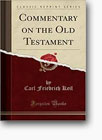The Immortality of the Soul: A Protest
by Joseph Agar Beet D.D.
August 25th, 1901
Chapter Three
Immortality In The Early Church
IN ch. 1:we saw that Plato taught that the soul of man is immortal, i.e. that, for good or ill, immortality is its inalienable attribute; in contrast, as we saw in ch. 2., to Christ and His Apostles, who taught that incorruptibility - i.e. a state without decay - and eternal; life are the reward awaiting the righteous, whereas destruction awaits the wicked. We shall now consider what the early Christian writers, living in an intellectual environment greatly influenced by the teaching of Plato, said about the immortality of the soul and about the eternal life promised by Christ to the righteous.
The earliest Christian writers reproduce the thought, and in large measure the language, of the New Testament, and say nothing about, or reject, the immortality of the soul. CLEMENT OF ROME, in his Epistle To the Corinthians, ch. 35, speaks of "life in immortality" as a gift of God to the righteous. So IGNATIUS, To Polycarp, Ch. 2, "Be sober, as God's athlete: the prize is incorruptibility and life eternal." He writes To the Magnesians, ch. 20, about "the medicine of immortality, an antidote so as not to die but to live in Jesus Christ always."
In JUSTIN's Dialogue with Trypho, chs. 5, 6, we have a conversation of the writer with an aged Christian about the immortality of the soul as taught by Plato. This doctrine, both speakers repudiate on the ground that the soul has been begotten, and therefore cannot be immortal. The old man continues, "I do not say that all souls die: for that were truly a piece of good fortune for the wicked." (This means, apparently, that they do not die when the body dies.) "The souls of the pious remain in a better place, while those of the unjust and the wicked are in a worse, waiting for the time of judgment. Thus some who have appeared worthy of God never die; but others are punished so long as God wills them to exist and be punished. . . . Now the soul partakes of life, since God wills it to live. Thus then it will not even partake of life when God does not will it to live. For, to live is not its attribute, as it is God's; but, as a man does not live always and the soul is not for ever joined to the body, since whenever this harmony must be broken up the soul leaves the body and the man exists no longer, even so, whenever the soul must cease to exist, the spirit of life is removed from it and there is no more soul but it goes back to the place from whence it was taken." The whole dialogue leaves no room to doubt that Justin did not hold Plato's doctrine of the endless permanence of all human souls.
THEOPHILUS To Autolycus, bk. 2:27, writes: "But some will say to us, Was man by nature mortal ? Certainly not. Was he, then immortal? Neither do we affirm this. But one will say, Was he then nothing? Not even this hits the mark. He was by nature neither mortal nor immortal. For, if He had made him immortal from the beginning, He would have made him God. Again, if He had made him mortal, God would seem to be the cause of his death. Neither then immortal nor yet mortal did He make him, but, as we have said above, capable of both; so that if he should incline to the things of immortality, keeping the commandment of God, he should receive as reward from Him immortality, and should become God; but if, on the other hand, he should turn to the things of death, disobeying God, he should himself be the cause of death to himself. For God made man free, and with power over himself. That, then, which man brought upon himself through carelessness and disobedience, this now God bestows on him as a gift, through His own kindness and pity, when men obey Him. For, as man, disobeying, drew death upon himself, so, obeying the will of God, he who desires is able to gain for himself life eternal. For God has given us a law and holy commandments; and every one who keeps these can be saved, and, obtaining the resurrection, can inherit incorruptibility."
Somewhat later IRENAEUS writes, in bk. 2:34- 3, that "The Father of all imparts continuance for ever and ever on those who are saved. For life does not arise from us, nor from our own nature, but is bestowed according to the grace of God. And therefore he who shall preserve the life bestowed upon him and give thanks to Him that imparted it, shall receive also length of days for ever and ever. But he who shall reject it and prove himself ungrateful to his Maker, inasmuch as he has been created and has not recognised Him who bestowed the gift upon him, deprives himself of the privilege of continuance for ever and ever. And for this reason the Lord declared to those who showed themselves ungrateful to Him, If ye have not been faithful in that which is little, who shall give you that which is great? indicating that those who, in this brief temporal life, have shown themselves ungrateful to Him who bestowed it, shall justly not receive from Him length of days for ever and ever."
On the other hand, in bk. 5:4. 1, (cf. ch. 7. 1,) Irenaeus speaks of the soul as one of the things "which are by nature immortal, and to which it belongs by their own nature to live." This apparent contradiction reveals the influence of two contradictory lines of thought."
At the close of the second century CLEMENT OF ALEXANDRIA writes, "Let us observe God's commandments and follow His counsels: they are the short and direct way that leads to eternity," i.e. to eternal existence; and again, "When baptized, we become enlightened; enlightened, we become sons; as sons we become perfect and immortal." See Paed. 1. 3, 6.
From a fragment of a lost work On the Soul, the following words are quoted in Migne's edition of Clement, vol. 2:p.751: All souls are immortal even of the godless, to whom it were better not to be incorruptible." But nothing similar is found in Clement's extant voluminous works.
In the middle of the second century TATIAN writes, in his Address to the Greeks, ch. 13:"The soul is not in itself immortal, O Greeks, but mortal. Yet it is possible for it not to die. If indeed it knows not the truth, it dies and is dissolved with the body, but rises again at last at the end of the world with the body, receiving death by punishment in immortality." About the demons, he says, in ch. 14: "That which is now their chief distinction, that they do not die like men, they will retain when about to suffer punishment: they will not partake of everlasting life so as to receive this, instead of death, in a blessed immortality. And as we, to whom it now easily happens to die, afterwards receive the immortal with enjoyment or the painful with immortality, so the demons who abuse the present life to purposes of wrong doing, dying continually even while they live, will have hereafter the same immortality, like that which they had during the life they lived, but in its nature like that of men, who actually performed what the demons prescribed to them during their lifetime." The phrases punishment in immortality and the painful with immortality deviate from the phraseology of the New Testament. For there the term immortality and its equivalents incorruptibility and eternal life are used only to describe a state of blessing. Thus Tatian approaches the language of Plato, with whose writings he was familiar.
We turn now to a very able treatise on The Resurrection of the Dead by ATHENAGORAS, an Athenian philosopher who became a Christian in the latter half of the second century. He writes in ch. 13 that God "made man of an immortal soul and a body;" in ch. 24, of "men possessing an immortal soul and a rational judgment;" in ch. 20, of "the soul as incorruptible;" and in ch. 23, of an "immortal nature." Here for the first time probably in Christian literature we find the favourite phraseology of Plato: and, remembering that the writer was a student of Plato before he became a Christian, we cannot doubt the source from which it was derived.
The writer's aim is to prove the resurrection of the body: and in his effort to do this he shows much skill. His main argument is that the creative purpose of God included both soul and body; that each of these is an integral part of the man, is concerned in his actions, and therefore must share his judgment and final destiny. Some of his arguments seem to imply that the creative purpose must necessarily be accomplished; and he tells us, in ch. 25, that the end of an intelligent creature is to delight in contemplation of God. But he admits that many men fail of this end. He does not discuss the ultimate fate of the lost; and leaves us in uncertainty whether or not all will finally be saved. His one point is to prove that in the destiny of man the body will share. In this he differs widely from Plato, who claims immortality only for the soul.
We come now to TERTULLIAN, who, in North Africa, wrote in Latin at the beginning of the third century. He accepts from Plato the doctrine of the immortality of the soul. So in ch. 3 of his treatise On the Resurrection of the Flesh: "Some things are known even by nature: the immortality of the soul, for instance, is held by many; the knowledge of God is possessed by all. I will use, therefore, the opinion of a Plato when asserting Every soul is immortal." But, as a Christian, he rejects the theory of the uncreated pre-existence of the soul. So his treatise On the Soul, ch. 4: "When we acknowledge that the soul originates in the breath of God, it follows that we attribute to it a beginning. This Plato refuses, representing it as not born and not made." In ch. 10 he says, "It belongs to firm faith to say with Plato that the soul is simple, i.e. uniform in substance." Throughout these two works, Tertullian constantly speaks of the soul as immortal in Plato's sense of the word, and sometimes of the wicked as in endless suffering. So Resurrection of The Flesh, ch. 34: "We so accept the soul's immortality as to believe it lost, not in the sense of destruction but of punishment, i.e. in Gehenna." Also in ch. 35: "If any one supposes that the destruction of soul and flesh in Gehenna refers to an annihilation and end of both substances, as if they were to be consumed, not punished, let him remember that the fire of Gehenna is announced to be eternal, for eternal punishment, and let him recognise that eternity of killing is more to be feared than anything temporal which man could inflict." He argues, in ch. 14 of his treatise On the Soul, that, since the soul is simple, not composite, it cannot be dissolved or cease to be.
No one can read these two treatises of Tertullian, and compare them with earlier Christian literature, without feeling that this impulsive African has introduced into Christian literature, or given greater prevalence to, two new and lower elements, the natural immortality of the soul and the endless torment of the lost. In the sufferings of these last he exults with fiendish delight: On Public Exhibitions, ch. 30. But I forbear to quote his awful lines.
Somewhat later, in a far different spirit, ORIGEN, the earliest Christian Biblical scholar, accepted the immortality of the soul, and from it inferred that all souls will ultimately be saved. In his First Principles, bk. 3:I3, we read "It is not without reason then that he who is abandoned is abandoned to the Divine judgment, and that God is long-suffering with certain sinners but because it will be for their advantage, with respect to the immortality of the soul and the unending world, that they be not quickly brought into a state of salvation, but be conducted to it more slowly, after having experienced many evils. For as physicians who are able to cure a man quickly when they suspect that a hidden poison exists in the body, do the reverse of healing, making this more certain through their very desire to heal, deeming it better to retain the patient for a considerable time under inflammation and sickness, in order that he may recover his health more surely, rather than to appear to produce a rapid recovery, and afterwards to cause a relapse and thus that hasty cure last only for a time; in the same way God also, who knows the secret things of the heart and foresees future events, in His longsuffering permits certain events to occur, and by means of those things which happen from without extracts the secret evil, in order to cleanse him who through carelessness has received the seeds of sin. . . . For God governs souls not with reference, let me say, to the fifty years of the present life, but with reference to the limitless age: for He made the thinking principle in its nature immortal and kindred to Himself: and the rational soul is not, as it is in this life, excluded from cure."
In the above quotations we see two practical and opposite consequences of the doctrine of the immortality of the soul. Tertullian inferred from it the endless suffering of the lost; Origen inferred the ultimate salvation of all men. Each of these inferences seems to me legitimate; and each is prevalent now. They reveal the greatness of the issues involved in the doctrine before us.
Very perplexing is the following apparent contradiction between two closely related works of ATHANASIUS. In §§ 32, 33 of his treatise Contra Gentes, he speaks several times of the soul as immortal; and argues that, "just as the senses of the body, it being mortal, contemplate mortal things, so the soul, since it contemplates and takes into calculation immortal things, must necessarily also itself be immortal and live always." He thus reproduces the phrase and thought of Plato, as accepted by Athenagoras and Tertullian.
On the other hand, in his famous treatise, On the Incarnation of the Word of God, he writes as though the lost would sink into the non-existence from which originally the Creator called them. So § 4: "For the transgression of the commandment was turning them back to their natural state; so that, just as while not existing they have begun to be, so also naturally, in course of time, they may undergo corruption into nonexistence. For if, being once by nature nonexistent, by the coming, and the philanthropy of the Word they were called into existence, it was a consequence that men, having been emptied of thought about God and having turned away to things non-existent - for the evil things are nonexistent and the good things existent, since they have come into being from the Existent God - should be emptied even of existing always. This means that they be dissolved, and remain in death and corruption. For man is by nature mortal, having come into being out of things not existing. But, because of his likeness to Him that exists, if he guard it by his contemplation of Him, he would disarm the corruption by nature and remain incorruptible."
Similarly, in § 6 he speaks of men, though made in the image of God, as disappearing and being destroyed in consequence of sin; and gives this as a reason for the mission and gift of the Son to save man. "It was unfitting that beings once made rational and partakers of His Word should perish and turn again, by corruption, into non-existence."
The only explanation of this contradiction which I can suggest is that the above incompatible statements of doctrine reflect different types of teaching prevalent in the Church in Athanasius' day, each going, in my opinion, beyond the teaching of the Bible, viz. (1) the essential permanence of all human souls, and (2) that the destruction threatened to those who reject salvation involves ultimate loss of existence. The incompatibility of these types of teaching had apparently not arrested the attention of the youthful theologian destined to mould so greatly and so beneficially the theology of the Church of Christ.
The prevalence, in the West, of the doctrine of the immortality of the soul, in the sense of its essential and endless permanence, is due probably to the immense influence of AUGUSTINE. This great father was familiar with the systems of the Greek philosophers; and among them gives the palm to Plato. But he contradicts Plato's teaching that human souls are pre-existent and without beginning; and meets an argument that whatever had a beginning must also have an end. His whole teaching about the future punishment of sin rests on the assumption that the human soul is immortal. So his City of God, bk. 13:2: "The human soul is truly affirmed to be immortal . . . it is said to be immortal because in some way it does not cease to live and feel." Similarly bk. 21:3:"Death will be eternal; since the soul, through not having God, will not be able to live, nor by dying to escape the pains of the body." So a little lower: "The soul can suffer pain and cannot die. Here is found a thing which, since it has sense of pain, is immortal." And much more of the same sort.
To sum up. The phrase, the soul immortal, so frequent and conspicuous in the writings of Plato, we have not found in pre-Christian literature outside the influence of Greek philosophy; nor have we found it in Christian literature until the latter part of the second century. We have noticed that all the earliest Christian writers who use this phrase were familiar with the teaching of Plato; that one of these, Tertullian, expressly refers both phrase and doctrine to him; and that the early Christian writers never support this doctrine by appeals to the Bible, but only by arguments similar to those of Plato. We have learnt that by this phrase Plato and the earliest Christian writers who use it asserted the endless and essential permanence of all human souls, and appealed to this doctrine in proof of retribution beyond the grave. But we have failed to find any trace of this doctrine in the Bible. On the other hand, Christ and His Apostles teach clearly and frequently retribution beyond death, and eternal life with God for all who put faith in Christ. The hope of immortality, however, rests, in the New Testament, not on the nature of the soul, but on the "promise of life in Christ Jesus."
The doctrine of the immortality of the soul differs further from the immortality promised in the New Testament in that this last is not for the body only, as Plato taught, but for the whole man, body and soul.
Doubtless the doctrine before us was welcome in the early Church, as in a still earlier day to some devout Jews, because of the support it renders to the all-important doctrine of retribution beyond the grave. But, as we have seen, it is altogether alien, both in phrase and thought, to the teaching of Christ and His Apostles.











Comments